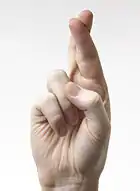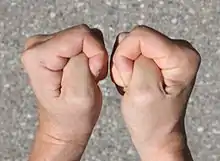Crossed fingers
To cross one's fingers is a hand gesture commonly used to wish for luck. Occasionally it is interpreted as an attempt to implore God for protection.[1] The gesture is referred to by the common expressions "cross your fingers", "keep your fingers crossed", or just "fingers crossed". The act of crossing one's fingers mainly belongs to Christianity. The earliest use of the gesture had two people crossing their index fingers to form a cross.

The use of the gesture is often considered by children as an excuse for telling a white lie.[2] By extension, a similar belief is that crossing one's fingers invalidates a promise being made.[3]
Emoji
One can express crossed fingers in textual communication using U+1F91E 🤞 HAND WITH INDEX AND MIDDLE FINGERS CROSSED (HTML 🤞). This symbol was approved as part of Unicode 9.0 in 2016 and added to Emoji 3.0 in 2016.
Origin
Courts of Mosaic law would often render verdicts with the phrase "May God have mercy upon your soul" to reaffirm God's supreme authority over the law. Most judges felt that while they could pass a sentence of death upon a person, they personally did not have the authority to destroy souls and that only God had the authority to do that.[4][5] As a result, some judges would cross their fingers whenever they said the phrase as a result of concern for the criminal's soul as they said it as a prayer.[6][4] It is also believed that in the early days of Christianity people used it to signal their belief to others.[7]
Common usage of the gesture traces back to the early centuries of the Christian Church, and likely earlier. Christians who would cross their fingers to invoke the power associated with Christ's cross, i.e. blessing. In 16th-century England, people cross fingers or make the sign of the cross to ward off evil, as well as when people coughed or sneezed.[8]
Anecdotal use
The 1787 A Provincial Glossary, with a Collection of Local Proverbs, and Popular Superstitions by Francis Grose records the recommendation to keep one's fingers crossed until one sees a dog to avert the bad luck attracted by walking under a ladder.
Exception

In Vietnam the gesture is considered rude,[9][10] especially to another person. Referring to female genitals, it is comparable to the finger in western culture.
In German-speaking countries and also Sweden the gesture is a sign of lying. Instead wishing for luck is gestured by holding thumbs. The same gesture is used in many Slavic countries such as Poland,[11] the Czech Republic, Slovakia, Bulgaria and ex-Yugoslav[12] republics. In South Africa, Afrikaans speakers also have the related phrase "duim vashou" meaning "holding thumbs tightly".
References
- Orange Coast Magazine. Emmis Communications. May 1990. pg. 177. "In early Christian days, a believer confronted by evil or hostile influences implored the power of the Holy Cross for protection by twisting his middle finger over his forefinger and holding the remaining fingers down with his thumb."
- Field Guide to Gestures. Quirk Books. 2003. pg. 201. "Children are a big proponent of this gesture, though they usually use it when telling white lies, believing that having the fingers crossed behind the back makes it okay to fib."
- de Lint, Charles (2007). Widdershins. Macmillan. p. 287. ISBN 0765312859. Widdershins. Retrieved 2013-05-29.
To a child, forget ethics. Crossing your fingers while making a promise truly invalidated the promise.
- Darrow, Clarence (2005). Closing Arguments: Clarence Darrow on Religion, Law, and Society (reprint ed.). Ohio University Press. p. 156. ISBN 0821416324.
- "Chicago Law Journal Weekly". 1. Law journal print. 1896. p. 61.
- The Christian Register. 89. American Unitarian Association. 1910. p. 1159. ISSN 2158-1622.
- "fingers crossed". Theidioms.com. The Idioms Dictionary.
- Good Housekeeping, Volume 226. International Magazine Company. 1998.
Crossing fingers: This was a Sign of the Cross that early Christians could use to avert bad luck without attracting the notice-and wrath-of pagans.
- "Things not to do in Vietnam #1: "Crossed fingers"". Weirdwonderfulvietnam.wordpress.com. 29 May 2015. Retrieved 13 December 2017.
- "Vietnamese body language and what it means". Vietnameselanguage.wordpress.com. 29 May 2011. Retrieved 13 December 2017.
- Polish-language Wikipedia: trzymanie kciuków
- "Držati (nekom) palčeve. - Idioms". Lyricstranslate.com. Retrieved 13 December 2017.
External links
 Media related to Fingers crossed at Wikimedia Commons
Media related to Fingers crossed at Wikimedia Commons